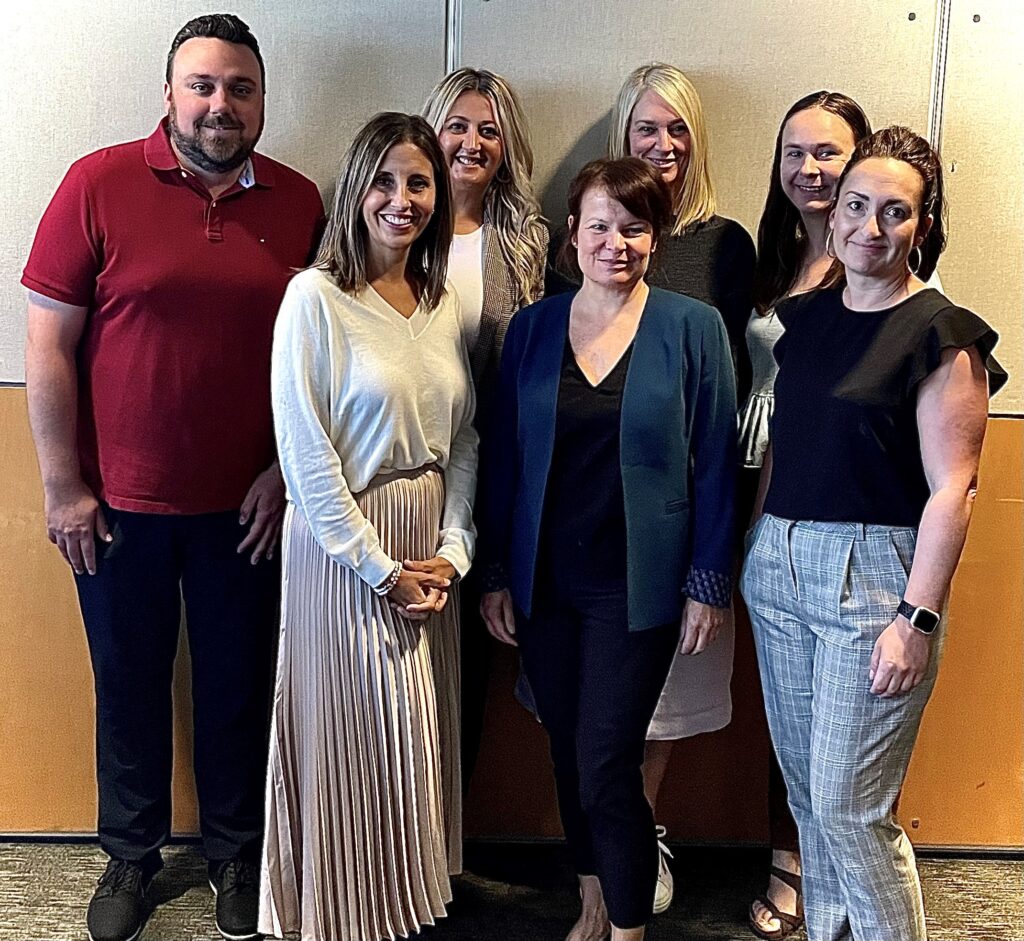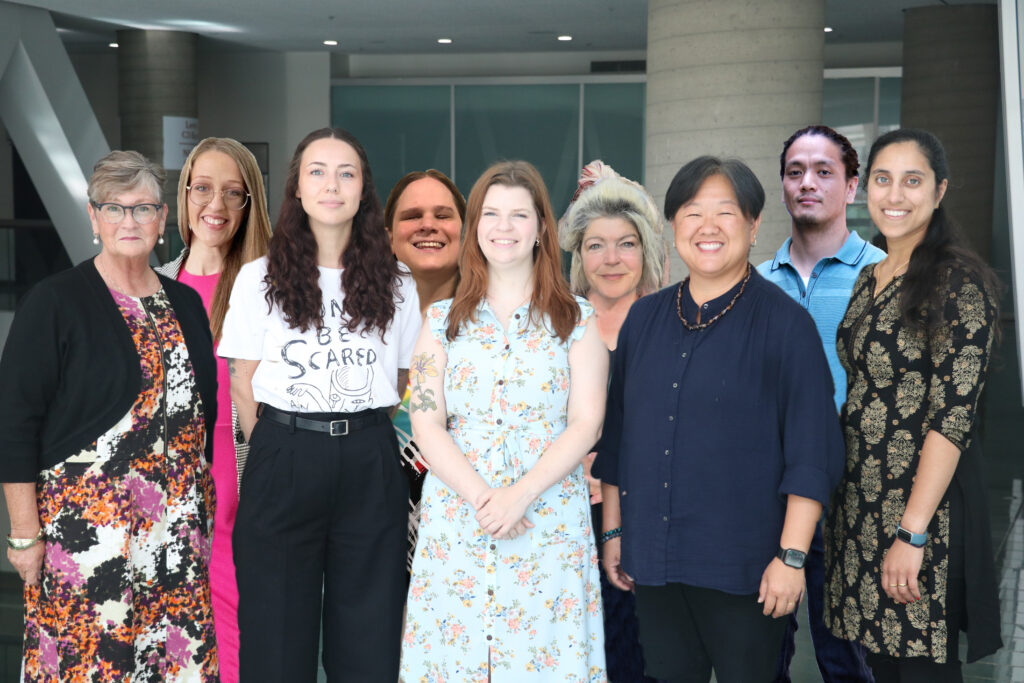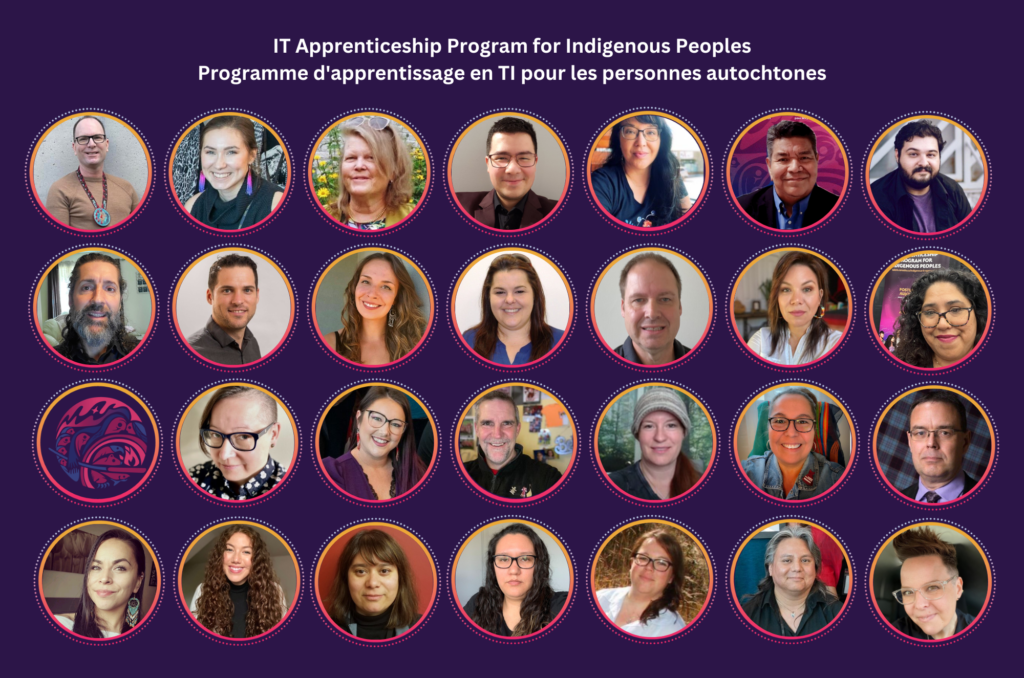This award recognizes a team that has made a significant impact in HR policy development, program management and/or service delivery related to promoting a diverse, inclusive and accessible workplace. This award magnifies the leadership and hard work of the teams who are influencing openness in our organizational culture, and who are promoting and enabling equity of opportunity through fairness and transparency.

Recipient
People, Culture and Workplace Sector
Financial Transactions and Reports Analysis Centre of Canada (FINTRAC)
Team Lead: Sophie-Anne Tremblay, Team Leader of HR Programs & Policies
Team Members: Rachel Bleskie, Julien Cote, Jelena Gingras, Manon Henry, Geneviève Joly and Annick Morin

This team played a pivotal role in driving a positive cultural shift, promoting the acceptance of unique differences and cultivating a genuine commitment to understanding the essence of accessibility. Moreover, their leadership in spearheading the Neurodiversity Recruitment Pilot Project sparked a transformative culture change throughout the organization. This began with a strategic learning agenda to break down stigmas surrounding individuals with cognitive disabilities and their ability to contribute to positive business outcomes. As a result, hiring managers discovered new recruitment methods that challenged the status quo and gave an awareness of their unconscious biases – thereby making them better leaders. The success of the project required effective planning, engagement and collaboration, which was particularly important when working with key partners as they gained a greater understanding of their role in onboarding new employees with disabilities and how traditional business processes can be improved.
The outcomes were exceptional, with the agency ranking among the top ten in the Government of Canada for hiring individuals with disabilities. Most importantly, this shift has had a lasting and extensive impact. Moving forward, this project will inspire many to seek further enhancements in all hiring practices and to provide ongoing support for the career development and advancement of individuals with disabilities.
“The team demonstrated a strong commitment to breaking down the stigma surrounding neurodiversity through very effective education programs to help hiring managers understand their unconscious biases.”
Finalists
ISED Accessibility Secretariat
Innovation, Science and Economic Development Canada (ISED)
Team Lead: Liane Desmarais-Cavanagh, Manager
Team Members: Anne Batten, Tamara Bukva, Jonathan Canivel, Brittany Clayton, Natasha D’Souza, Christine Mao, Kathleen McKee and Pennylynn Woodruff

From left to right are:
- Liane Desmarais-Cavanagh
- Anne Batten
- Tamara Bukva
- Brittany Clayton
- Kathleen McKee,
- Pennylynn Woodruff
- Christine Mao
- Jonathan Canivel
- Natasha D’Souza
The ISED Accessibility Secretariat is a group of dedicated individuals who are devoted to ensuring that all ISED employees have the tools, understanding and knowledge required to build their confidence with applying accessibility measures, to practice accessibility in all its forms, and to create an accessible and inclusive culture. The team created and initiated several programs and tools that continue to benefit both the department and the federal public service at large.
For example, they created the Accessibility Matters at ISED course – an in-house, online, 24/7 training tool for employees to learn and verify their accessibility knowledge. They also created the ISED Accessibility Feedback Forms – online forms used by both employees and the public to disclose barriers to accessibility at the department. The Guide to Accessible Meetings at ISED is another tool created by the team to help employees in ensuring their meetings are accessible and inclusive of all participants. Similarly, they trained a grassroots community of volunteer employees, the ISED Accessibility Ambassadors Program, to support their colleagues with creating accessible communications and conducting accessible and inclusive meetings. Thanks to the contributions of the ISED Accessibility Secretariat, ISED can proclaim that due to a full departmental effort, including the perspectives of employees with disabilities, the department was able to create its 2023-2025 Accessibility Plan.
“Their contributions to the department and the heart they have poured into their work for our disabilities community is second to none.”
Office of Indigenous Initiatives team
Innovation Information and Technology Branch, Employment and Social Development Canada (IITB – ESDC)
Team Lead: James Heffernan, Executive Director, Office of Indigenous Initiatives
Team Members: Jeffrey Brant, Andrew Caldwell, Chev Cheechoo, Meagan Commonda, Debra Cunday, Isa David, Gerardo Escandon, Samantha Groenheide, Glenn Hall, Lauren Hunter, Nancy Jackson, Ashley Jerome-Commonda, Holly Johnstone, Kevin Lagace, Julie Lalonde, Carol Lane, Jeannette Longchap, Jane Luhtasaari, Brooke Mackey, Steven Maracle, Morgan Marshall, Gray O’Byrne, Laurie Odjick, Anteia Organ, Gary Patsey, Karine Picard, Noodloo Pishuktie, Lorne Sundby and Valerie Thomas

- From left to right, first row (top): Andrew Caldwell, Brooke Mackey, Carole Lane, Chev Cheechoo, Deb Cunday, Gary Patsey, Gerardo Escandon
- From left to right, second row: Glenn Hall, Gray O’Byrne, Holly Johnstone, Isa David, James Heffernan, Jane Luhtasaari, Jeannette Longchap
- From left to right, third row: Julie Lalonde, Karine Picard, Kevin Legace, Lauren Hunter, Laurie Odjick, Lorne Sundby
- From left to right, fourth row (bottom): Meagan Commonda, Morgan Marshall, Nancy Jackson, Noodloo Pishuktie, Samantha Groenheide, Steven Maracle, Val Thomas
- Not shown: Jeffrey Brant, Ashley Jerome-Commonda, Anteia Organ
The Office of Indigenous Initiatives team in the Innovation, Information Technology Branch of ESDC is leading the way in increasing the recruitment, retention and mobility of Indigenous Peoples in the federal public service. The Information Technology (IT) Apprenticeship Program for Indigenous Peoples was initially launched as an innovative pilot within the organization; through effective collaboration with TBS and various other departments, it later evolved into a comprehensive government-wide initiative. The program creates a pathway to employment in the field of information technology for First Nations, Inuit, and Métis peoples, and has attracted over 280 applications from close to 100 different Indigenous communities.
Through their dedicated efforts, the team tackled the barriers that typically exist in public service recruitment and hiring models head-on, including the standard education attainment requirement for the IT occupational group. The program values the diversity of life experience – hiring based on passion and potential, rather than on education credentials. This approach addresses the significant discrepancy that exists in educational attainment rates between Indigenous peoples and non-Indigenous peoples in Canada. As a result of the team’s incredible efforts, more than 80 Indigenous IT apprentices have been hired across 20 departments and agencies to date.
“Through demonstrated results, they have moved beyond talk to action in adapting the government’s organizational culture, promoting and enabling equity of opportunity through fairness and transparency.”
Notable Nominees
Corporate Learning Strategies Team
Employment and Social Development Canada (ESDC)
Team Lead: Sandra Di Giantomasso, Manager
Team Members: Kimberly Batten, Joseph Burt, Corina Franklyn, Stephane Kadoch, Vinojan V Kanagaratnam, Caroline Lauzon, Alison Seaman and Victoria Valeri
The Corporate Learning Strategies (CLS) team develops learning programming that promotes a diverse, inclusive and accessible workplace for all. Through innovative and deliberate program design, they have increased awareness, developed knowledge and skills, and spurred behavioural changes among ESDC’s workforce of over 42,000 employees, demonstrating an impressive commitment to the Clerk’s Call to Action on Anti-Racism, Equity and Inclusion.
This year, CLS developed and designed 39 diversity, equity and inclusion training sessions, including anti-racism workshops and ‘Ask Me Anything’ sessions. Furthermore, the team designed ESDC’s first-ever Culture Conference – a virtual, weeklong conference that helped increase the organization’s awareness of how diverse identities and lived experiences play a significant role in workplace inclusion. CLS was also a trailblazer in HR program management and developed ESDC’s first Accessibility Learning Strategy, using a truly “Nothing About Us Without Us” approach. Through their many efforts, CLS has helped moved the markers for creating systemic organizational culture change across ESDC and has demonstrated unparalleled dedication to doing their part to create not only an accessible and inclusive ESDC, but a truly barrier-free public service for all.
Inclusion, Diversity, Equity and Accessibility (IDEA) Group
Natural Resources Canada (NRCan)
Team Lead: Shannon Mezzetta, Manager
Team Members: Angela Accetura, Anteya Allard, Christine Doyle, Alexandra Furino, Michelle Greer, Cory Hunter, Marie-Claude Richard, Laura Rombough and Jennifer Talsma
The team has evolved well beyond its initial mandate to provide advice and guidance under the employment equity program, to playing a central role in influencing the department’s culture at every level, leading to concrete steps to achieve the goals outlined in the Clerk’s Call to Action and NRCan’s ambitious change agenda with respect to inclusion, diversity, equity and accessibility (IDEA). These efforts led to the elimination of departmental employment equity gaps for NRCan as of September 2022. The team continues its work to ensure the department reflects the changing composition of the Canadian population and fosters an environment of openness and collaboration, with the intent of creating a safe space and where HR collaborations are seen as truly inclusive and meaningful.
Over the last year, the team was instrumental in implementing the talent acquisition strategy for the inclusive recruitment of all equity groups. They also led a campaign to improve Self Identification (ID) completion rates further to the adoption of the modernized Self ID form introduced by TBS in 2021. Finally, one of the team’s most notable achievements has been to the co-development of the NRCan 2022-2025 Accessibility Action Plan. They have operated with professionalism, grace and collegiality against a backdrop of ambitious priorities, significant workload and sometimes emotionally-charged conversations.
EE-Diversity NRCan
Natural Resources Canada (NRCan)
Team Lead: Shannon Mezzetta
Team Members: Laura Rombough
In 2020, Natural Resources Canada took early steps to address the legislated requirement of creating a departmental Accessibility Action Plan under the Accessible Canada Act guided by Nothing Without Us: An Accessibility Strategy for the Public Service of Canada. Through circumstances, progress stalled until the reorganization of the Human Resources Branch introduced two new players to the task in February 2022, with a hard publication deadline of December 31, 2022. The team parachuted in immediately to prioritize tasks and coordinate intensive consultations; they were receptive to implementing suggestions, having gone beyond minimum requirements to ensure the plan was tailored to the department’s needs. They created a welcoming space for diverse subject matter experts and AccessAbility Network members, with sensitivity and inclusion at the forefront. The more experts and network members engaged in co-developing the plan, the greater a sense of ownership and responsibility was felt amongst collaborators.
This is what “Nothing Without Us” looks like – asking, listening and acting with effectiveness and efficiency. The team’s contribution is an unprecedented example of “accessibility and inclusion by design”, with foresight and flexibility as NRCan strives for greater proficiency in accessibility.
Research and Development Unit at the Personnel Psychology Centre (PPC)
Public Service Commission (PSC)
Team Lead: Annie Lanteigne, Project Manager
Team Members: Precious Anyanwu, Krzysztof Duniewicz, Najat Firzly, Dominique Gosselin, Isabelle Hudon, Karine Montigny, Kylee Tamera, Minhtri Truong and Caroline Van de Velde
In response to the call to action for amendments to the Public Service Employment Act (PSEA), the PPC has mobilized a project team responsible for developing products that will help departments take the required action in their staffing activities. The project team performed a literature review, welcomed feedback from internal and external partners, and made an ongoing effort despite tight deadlines and unforeseen reversals, all while maintaining an unwavering enthusiasm. To achieve their objective, the team represented the PSC in discussions with employee networks, bargaining agents and senior employment equity, diversity and inclusion executives to better understand the experiences of equity-seeking group members, with empathy and active listening. The central team, supported by occasional collaborators, has acted as a catalyst for change within the public service with regard to the amendments to the PSEA.
Royal Canadian Air Force Professional Conduct & Culture Team
Royal Canadian Air Force (RCAF)
Team Lead: Amy Hall, Team Lead
Team Members: Stewart Greenslade, Gerry Hardy and Brian McLennan
The team accomplished a remarkable feat that occurs once in a generation for an organization the size of the RCAF at over 16,000 individuals: initiating a profound culture change. They began by conducting introspection, seeking consultations, performing thorough analyses and articulating their findings deliberately to identify areas requiring transformation. Unlike the traditional approach of keeping aspects such as equity, diversity, inclusion and accessibility as individual considerations rather than organizational ones, the team fearlessly delved into each of these aspects to directly address HR gaps. Driven by a strong belief in the fundamental rights of equity, diversity, inclusion and accessibility, the team assembled a group of dedicated volunteers. They then devised a comprehensive, multi-year implementation plan, outlining actionable tasks and lines of effort, setting the RCAF firmly on a path to enhance its work culture, consequently bolstering the defense of the country.
The small, yet resilient network established throughout the RCAF has now become an integral part of the leadership teams at every RCAF Wing, actively contributing to ensuring equity, diversity, inclusion and accessibility in all operations across the organization, regardless of location and around the clock.